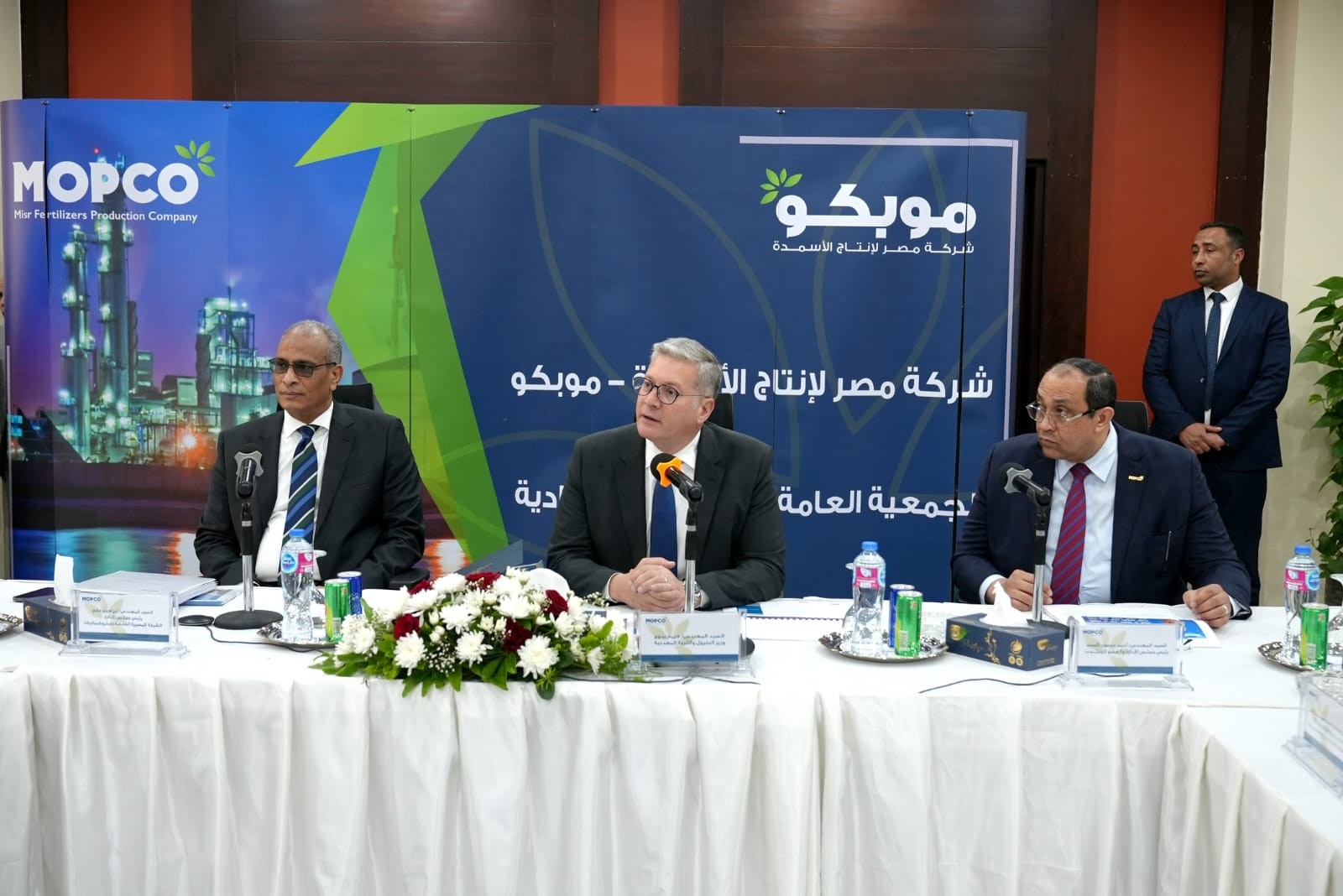News

MOPCO’s 2024 General Assembly Approval: Positive Indicators and Strong Performance
6 months agoEngineer Karim Badawi, Minister of Petroleum and Mineral Resources, attended the General Assembly of Misr Fertilizers Production Company (MOPCO) to approve the company's results for 2024. He affirmed that the petroleum sector attaches great importance to petrochemical industries, which add value to natural resources. The meeting was attended by Eng. Ibrahim Maki, Chairman of the Egyptian Petrochemicals Holding Company (ECHEM), Eng. Yass Mohamed, Chairman of the Egyptian Natural Gas Holding Company (EGAS), and chaired by Eng. Ahmed Mahmoud El-Sayed, Chairman and Managing Director of MOPCO, along with major shareholders, board members, and public offering shareholders.
The Minister praised MOPCO as a distinguished model of a world-class petrochemical company. He emphasized that its partnerships with Arab investors reflect deep regional and international cooperation, and he thanked the company’s employees for their efforts. He also highlighted the sector’s commitment to implementing green projects such as green ammonia, sustainable aviation fuel, and emission reduction efforts, which enhance the competitiveness of its products globally.
Eng. Ahmed Mahmoud presented a detailed overview of MOPCO’s key performance indicators, emphasizing the company’s alignment with the Ministry’s strategic pillars—especially regarding occupational health and safety, productivity efficiency, and sustainability. MOPCO recorded over 19 million safe working hours since 2018 and 72 million kilometers of safe driving. The company increased the production capacity of MOPCO 3 by 10% through a self-led upgrade of the HPCC unit, resulting in an additional $2 million in revenue and EGP 6 million in cost savings.
In terms of production, MOPCO delivered a strong performance, producing 1.718 million tons of urea and 1.069 million tons of ammonia, exceeding planned targets. Urea sales reached 1.741 million tons and ammonia 116,000 tons. Urea exports amounted to 947,000 tons, while 795,000 tons were supplied to the local market. Ammonia exports reached 48,000 tons, compared to 68,000 tons for local supply, with the European market accounting for 89% of urea exports.
Financially, MOPCO achieved exceptional performance in 2024, recording revenues of EGP 19.65 billion and a net profit of EGP 15.12 billion—a growth rate of 153% compared to 2023. Working capital increased to EGP 12.36 billion (7.2% growth), while total investments reached EGP 53.84 billion (6.5% growth), and shareholders’ equity grew to EGP 45.38 billion (4.9% growth), an 800% increase since 2015.
In the field of development projects, MOPCO continues to implement a strategic expansion plan, including enhancing plant efficiency, reducing gas consumption, the ADBLUE emissions reduction project, and the green ammonia production project in partnership with SCATEC and Norway’s Yara, with MOPCO holding a 25% stake in the Damietta Green Ammonia Company. It also holds a 20% stake in the sustainable aviation fuel project and is executing a pioneering CO₂ recovery project. The company is also exploring new opportunities in soda ash and silicon in the Alamein region.
Environmental sustainability is a top priority for MOPCO. The company operates a continuous self-monitoring system for emissions and holds ISO 14001 certification for environmental management. Fifteen MOPCO engineers are certified carbon footprint auditors. The company aims to produce Technical Grade Urea to reduce nitrogen oxide emissions. It follows the IOSS Prevention Policy for process safety, provides specialized engineer training, and actively works on energy and water conservation and emissions reduction. A solar panel project (4 MW capacity) is planned for completion by 2026.
Internationally, MOPCO participates in a green ammonia project in partnership with Norway and has hosted Latin American ambassadors to strengthen trade cooperation. On the community responsibility front, MOPCO is deeply engaged in supporting infrastructure, education, and healthcare projects. The company has earned ISO 26000 certification for social responsibility and invested in human capital by offering 1,710 training opportunities.
The General Assembly approved a cash dividend of EGP 3.5 per share, and the Extraordinary General Assembly agreed to increase the company’s capital from EGP 20 billion to EGP 28 billion by issuing free shares at a ratio of 0.379 per share.

